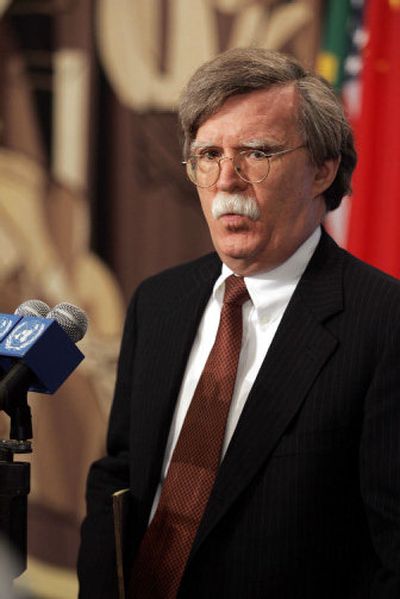U.S. may not wait for U.N. action on Iran

UNITED NATIONS – With increasing signs that several fellow Security Council members may stall a United States push to sanction Iran for its nuclear enrichment program, administration officials indicated Friday they are prepared to form an independent coalition to freeze Iranian assets and restrict trade.
The strategy, analysts say, reflects not only long-standing U.S. frustration with the Security Council’s inaction on Iran, but also the current weakness of Washington’s position because of its controversial role in a series of conflicts in the Middle East, most recently in Lebanon.
Despite assurances from Russia and China in July that they would support initial sanctions against Iran if it failed to suspend aspects of its nuclear program, Russia seemed to backtrack this week after Tehran agreed to continue talks but refused to halt enrichment. A Security Council resolution gives the Islamic republic until Thursday to stop uranium enrichment or face penalties.
Russian Defense Minister Sergei Ivanov said Friday that, as long as Iran was willing to negotiate, it was “premature” to punish the country and perhaps permanently isolate it.
“I do not know cases in international practice or the whole of the previous experience when sanctions reached their goals or were efficient,” Ivanov said. “Apart from this, I do not think that the issue is so urgent that the UN Security Council or the group of six countries (United States, China, Russia, Britain, France and Germany) should consider the introduction of sanctions.”
French Foreign Minister Philippe Douste-Blazy said Iran’s response “is not satisfactory” but that France wants to avoid a new conflict that could lead to “a clash of civilizations.”
“But the worst thing would be to escalate into a confrontation with Iran on the one hand, and the Muslim world with Iran, and the West,” he said on French radio. “That would be the clash of the civilizations that France today is practically alone in trying to avoid.”
U.N. Ambassador John R. Bolton said in an interview that the United States planned to introduce a resolution imposing penalties such as a travel ban and asset freeze for key Iranian leaders soon after the Aug. 31 deadline and seemed optimistic that China and Russia would come around once they saw the text. “Everybody’s been on board,” he said.
But in case Russia and China drag their heels, the United States is working a parallel diplomatic track outside the United Nations, Bolton said.
Washington could ramp up its own sanctions, including intercepting missile and nuclear materials en route to Iran and imposing financial constraints on Iran under existing terrorism laws and is encouraging other countries to follow suit, Bolton said.
“You don’t need Security Council authority to impose sanctions, just as we have,” he said in an interview.
The United States has had broad restrictions on almost all trade with Iran since 1987.
While U.S. officials say pursuing parallel paths is “common sense” and highlights the inefficiency of the Security Council, some analysts said the move would underline Washington’s inability to win over the council and the lack of options against a newly emboldened Iran.
“When you start doing things that would be better with the Security Council’s endorsement, does it show weakness or strength?” said George Perkovich, the director of the non-proliferation program at the Carnegie Endowment for International Peace. “Iran could argue that the U.S. couldn’t even get the Security Council backing, and so we are winning.”
Perkovich added that even traditional U.S. allies are fatigued by dealing with multiple conflicts, and don’t want to add Iran to the list of Afghanistan, Iraq and Lebanon.
“There is a general reluctance to follow the U.S. lead,” he said. “Our negotiating power is diminished, which is regrettable.”